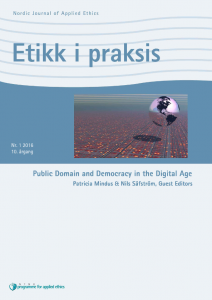CREATe researcher Kris Erickson has this week published an article in the open access Nordic Journal of Applied Ethics. The article reviews literature from law and economics which defines the public domain in economic terms. This approach to the public domain has become common post-Gowers with the political turn toward evidence-based IP policy-making. Public interest justifications for a vibrant public domain have been shifted to the background while a focus on economic efficiency, innovation and growth have achieved prominence.
 Advocating for wider consideration of the public interest in defining the public domain, Erickson finds a range of justifications which may evade current economic approaches:
Advocating for wider consideration of the public interest in defining the public domain, Erickson finds a range of justifications which may evade current economic approaches:
‘There are a range of public interest reasons for safeguarding and expanding a copyright public domain. It can enable consumers of media to shift roles to co-produce, critique and remix political speech; it can promote media literacy by giving educators and learners opportunity to access and transform expressive works; it can contribute to the legitimacy of the rule of law and intellectual property (by bringing the law in line with everyday practices); and it can promote intercultural understanding by constituting a reservoir of imagined collective history.’ (2016: 69).
The article appears in a special issue on Public Domain and Democracy in the Digital Age, edited by Patricia Mindus, Associate Professor in Practical Philosophy at Uppsala University and Nils Säfström, PhD candidate in Practical Philosophy at Stockholm University. Research supporting this article was funded by the Economic and Social Research Council (ESRC) and UK Intellectual Property Office (UK IPO) grant, ‘The Value of Public Domain Works’ (ES/K008137/1).
Read the article in full at the Nordic Journal of Applied Ethics
This article was originally posted on the CREATe blog by Peter Bennett.